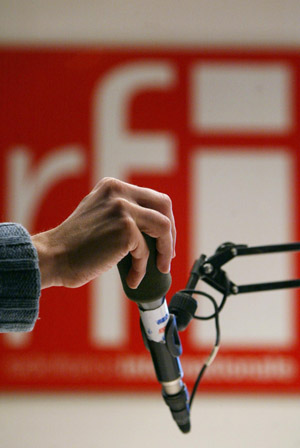Like many radio listeners in Kinshasa, the capital of the Democratic Republic of Congo, I tune to Radio France Internationale (RFI) on 93.4 FM or 105 FM. But beginning on July 24, the frequencies carried nothing but static. It was no accident. Media reports quoted government spokesman Lambert Mende as declaring a ban on RFI broadcasts.

At a press conference four days later, Mende claimed that RFI was guilty of “fanciful reporting about the war raging in DRC,” including “statements of a nature to demoralize the Congolese armed forces.” The DRC has been plagued by a series of wars, which have claimed 5 million lives since 1996, when rebels ousted former dictator Mobutu Sese Seko. The current conflict sees recurring fighting between the government and various militias in eastern, mineral-rich provinces. The provinces are among the most dangerous regions for journalists in Africa despite the presence of the United Nations’ largest peacekeeping force worldwide.
Relations between RFI and the government have been strained since 2006, when Ghislaine Dupont, then RFI correspondent in the DRC, produced a number of stories that did not please the authorities. The stories reported rising criminality within the ranks of the army, including rapes, looting, embezzlement of soldiers’ pay by superior officers in total impunity. She was subsequently expelled but has continued reporting on the country.
Three years later, to the displeasure of the government, RFI’s coverage has suggested that little has changed. In June, Mende accused Dupont of “attempting to destabilize the country” after the station reported government setbacks in managing the army and the peace process, among others. Mende used the same language to dismiss reports of human rights abuses by the International Federation of Human Rights, Human Rights Watch and Global Witness, as “slanderous” and “calling for the dismantling of the country.”
Reactions to the ban on RFI were divided. The Kinshasa-based media advocacy organization Journaliste en Danger called the move “a trampling of the freedom of the press.” However, for Zechariah Bababaswe, who runs a local-language newspaper, “the government’s decision is very important and necessary to call to order these media that exceed in the distortion of information and the dissemination of false information.”
There were also various opinions about the impact of the ban. Some noted that RFI can be heard on shortwave; others said they would simply turn to other international stations. With the national state media confiscated by the majority political group in power and the private Congolese press weakened by intense financial and political pressures, and repression, most Congolese tune to Radio Okapi, a joint project of the Hirondelle Foundation and the United Nations Mission in DRC (MONUC), and foreign stations like RFI for independent coverage.
Tuning to 93.4 FM today on my Roadstar car radio returned an unexpected, pleasant surprise: RFI! No public explanation was immediately offered. Neither was it clear whether the station’s return to one of its two FM frequencies was permanent.
But the government’s actions in the RFI case raise many questions. When informing the public becomes a crime, is it better to shut up before suffering the wrath of sanction? Or should we take the risk of informing on behalf of the public’s right to information? Mende warned that the authorities would not tolerate any information the government deems prejudicial to troop morale, “no matter the accuracy of the information.” This is already the doctrine of Congolese judges in matters of defamation. For example, Article 74 of the Congolese Penal Code states that defamation is the result of attributing to someone a precise fact harming their honor or exposing them to public contempt. Judges constantly interpret this article with the view that the truthfulness or falseness of the fact in question is irrelevant.
From the viewpoint of government, national interest trumps fundamental freedoms.
Charles M. Mushizi is a freelance investigative journalist, blogger, and lawyer in Kinshasa.